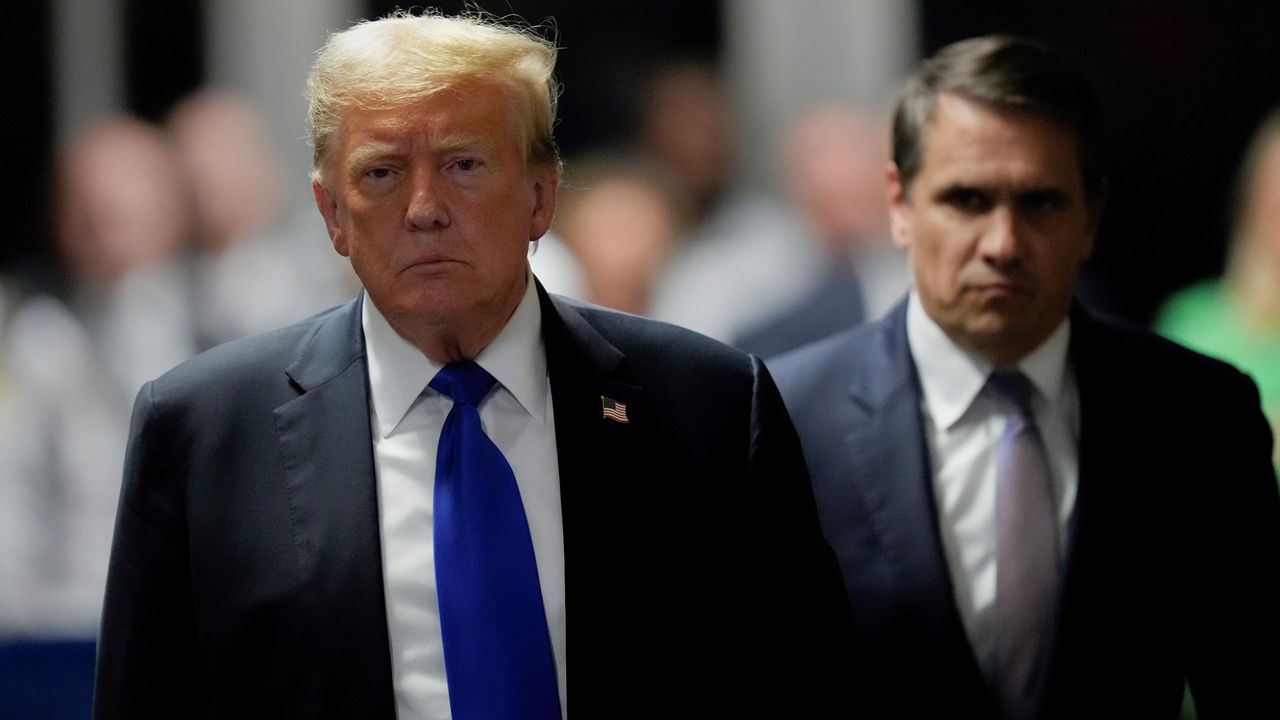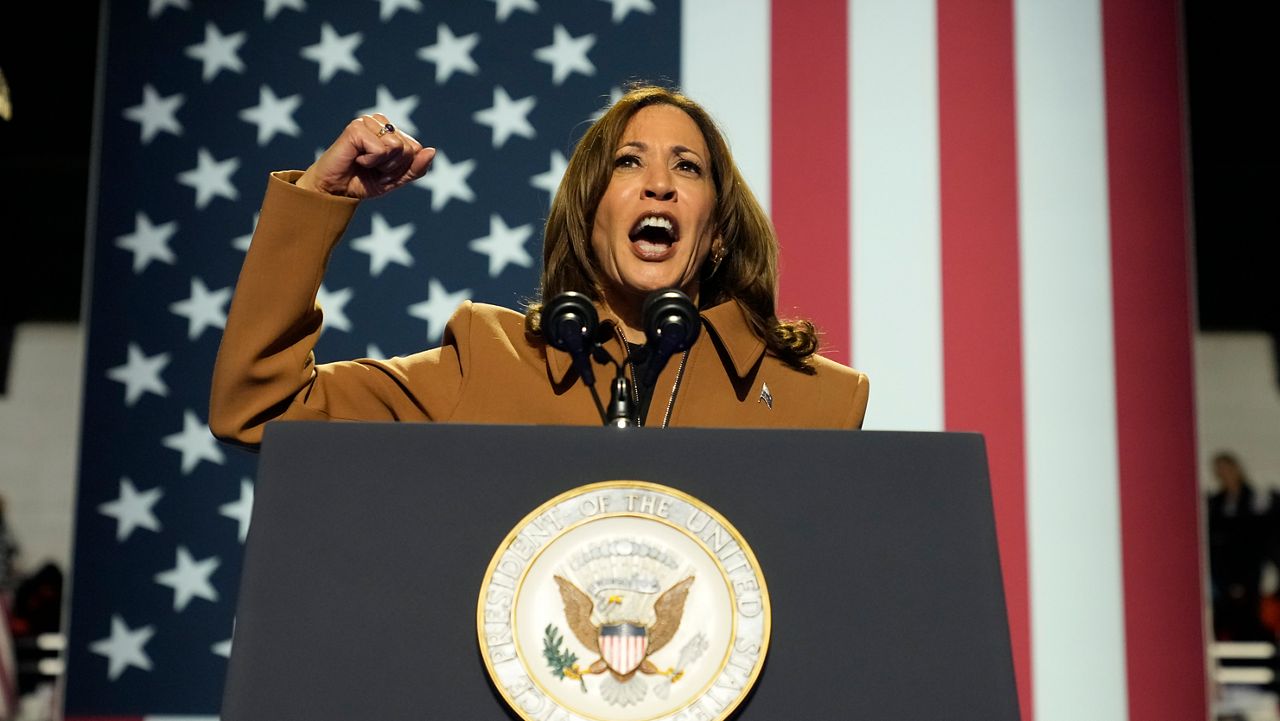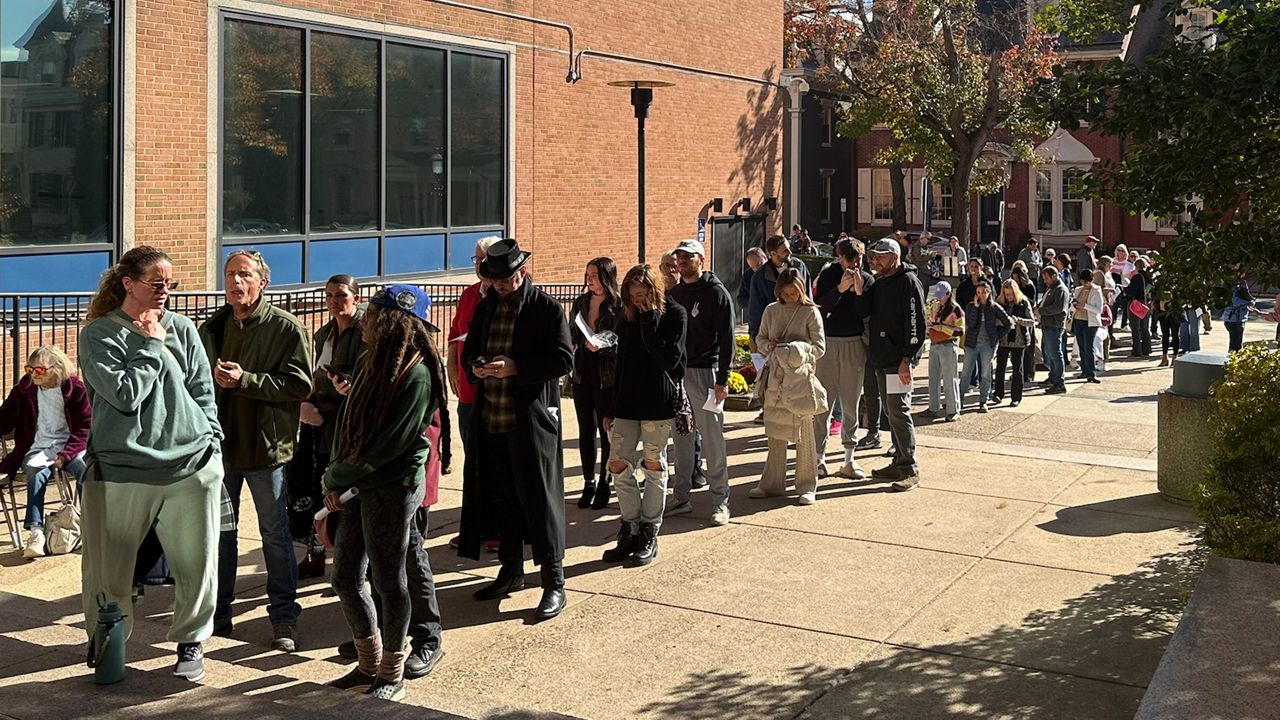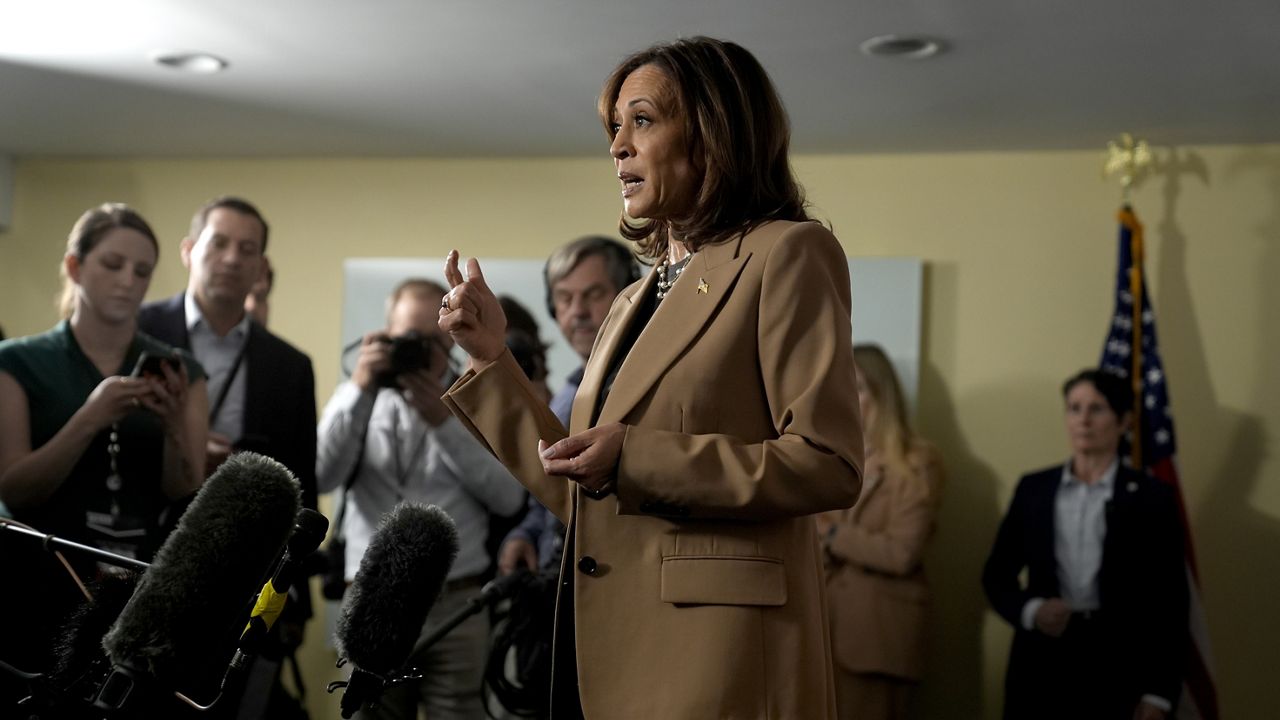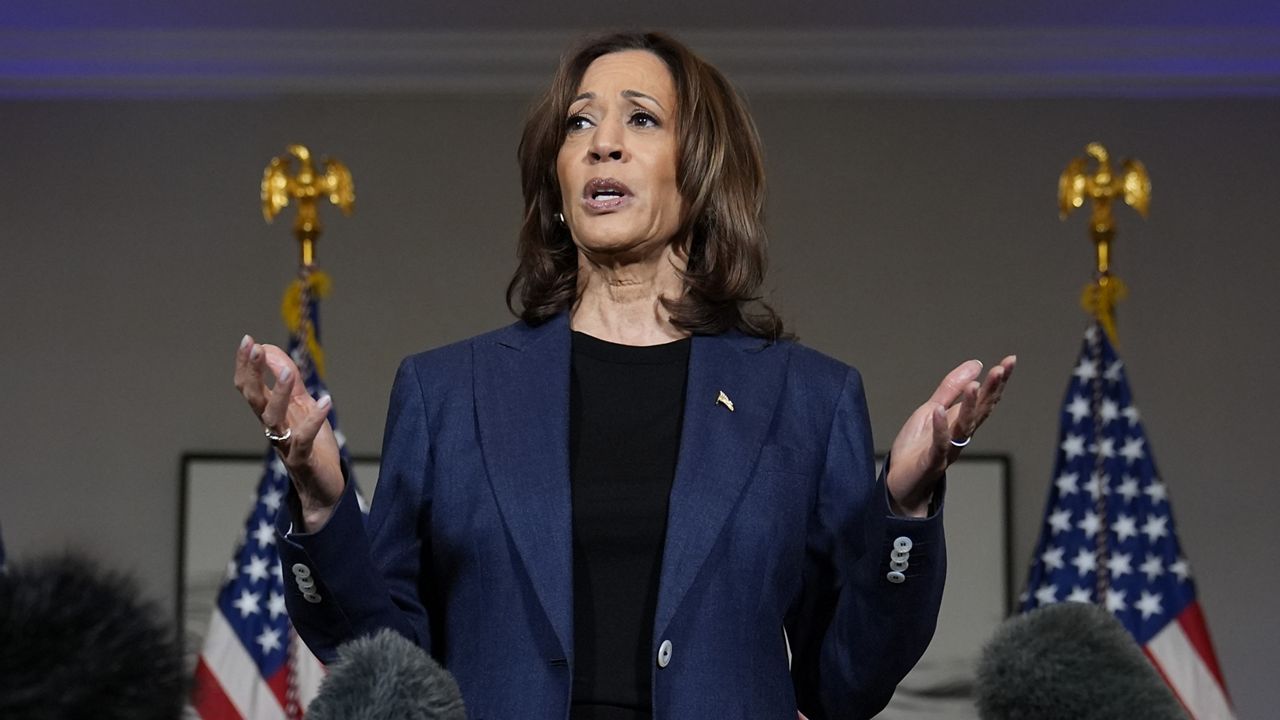With all eyes turning to Pennsylvania in the home stretch of the presidential election, it could be the college students in the key battleground state who determine who wakes up in the White House on Jan. 21.
A 2021 study from Institute for Democracy & Higher Education at Tufts University’s Jonathan M. Tisch College of Civic Life showed that 66% of college students voted in the 2020 election, a record and an increase from 52% in 2016. Younger voters backed Joe Biden over Donald Trump by 25%, according to the Pew Research Center.
Young Democrats who spoke to Spectrum News on a recent trip to the Keystone State say they are well aware of the influence college students hold – and the weight that comes with such responsibility.
“Are you registered to vote in Pennsylvania?” Lucas Eisen, a political science student at the University of Pennsylvania and political director of student group Penn Dems, asked his fellow students. “Do you want some signs?” he asked, when they answered in the affirmative.
“We're trying to get as many [students], especially the freshmen who are coming in from out of state, to register here as possible,” said Ellie Goluboff-Schragger, the president of Penn Dems, as Eisen was hawking signs to passing students.
Penn Dems is not affiliated with the Harris-Walz campaign, but it’s doing work to elect the vice president and Democrats up and down the ballot this November. And one of the easiest ways Goluboff-Schragger and Eisen say students can do that is to lend their vote to the swing state of Pennsylvania.
“I am a student in Philadelphia, and I think it's really important to vote in Pennsylvania. I'm living here for nine months out of the year, so this is like a community that I want to vote in and, and give my voice to,” explained Goluboff-Schragger, who originally hails from Virginia.
Goluboff-Schragger, a junior, told Spectrum News that the Penn Dems had less than 100 students in the club at the end of last year. When they returned to campus in the fall, with Harris as the nominee atop the Democratic ticket, more than 250 members became a part of the organization's group chat.
“The freshmen are super excited, there's kind of like a joyful atmosphere. I feel like everyone really wants to get out and do the work,” she explained.
As Eisen was trying to get students to register to vote in Pennsylvania, he explained that, coming from Chicago, he wasn’t worried about “Illinois turning red any time soon.”
“I'd rather contribute my Democratic vote to this state, where it is so much more crucial where it could…it's not going to be, you know, the deciding vote, but it could be one of a couple hundred or a couple of tens of thousands of deciding votes," Eisen, allso a junior, said. "So I'd rather contribute it here."
Further north at Lafayette College, a small liberal arts school just outside of Allentown, Pa., Rebekah Lazar said moving from safely blue New York it was a no-brainer to change her voter registration to Pennsylvania.
“Understanding the weight that Pennsylvania holds in this upcoming election, and to know the power that my vote has and the vote of other people in Pennsylvania – my peers, my friends, kind of everyone around me at Lafayette here – has really number one felt scary, but also exciting,” described Lazar. “I feel this pressure more than ever before to go out, to be engaged, to be active.”
Lazar, a junior, serves as the president of Lafayette for Reproductive Autonomy, Justice and Empowerment, a campus reproductive health organization. She says it’s an issue that weighs heavily on her not just for herself, but for her family – specifically for family who live within restrictive states.
“My sister's going to school in Florida and she's a freshman," Lazar said. "She's got four years there. So not only do I want to protect what I feel – what I feel is important with reproductive rights, individual choice, bodily autonomy, all of these issues for myself, the people around me and even my sister who's thousands of miles away.”
The Association of Independent Colleges and Universities of Pennsylvania (AICUP) reported in September that “each year, another 21,000 students move from their home state to one of the 85 independent nonprofit colleges and universities in Pennsylvania.”
In 2020, Biden won Pennsylvania over Trump by a little more than 80,000 votes. Given that narrow margin, college-aged students could play a major role in how the state will vote.
The Harris campaign says it is prioritizing young voters, and has been since she replaced President Joe Biden as the Democratic nominee. A source within the Harris campaign described it as a “three-pronged approach” to reach young voters – on campuses, online, and young people not affiliated with college campuses. With young voters get most of their information online and outside of traditional news outlets, the campaign has invested in digital ads, social media, and working with influencers on platforms such as Instagram, TikTok, YouTube.
In August, the Democratic National Committee invited 200 creators to the DNC, resulting in nearly 7,000 posts from 227 creators, drove 400 million impressions and resulted in $800 million in estimated media value, according to a source familiar.
On the staffing side, the campaign hired its youth engagement director, Eve Levenson, in January when in the past, the role was often filled much later in the cycle. The campaign has hired 150 youth and campus organizers to focus specifically on engaging young people in the battleground states, and during the campaign’s Youth Vote Week of Action, reports registering nearly 2,000 young voters and receiving over 9,000 commitments from young voters for the Harris-Walz ticket.
The campaign has also deployed big name surrogates to college campuses to reach voters on issues such as reproductive freedom – with Jack Schlossberg and actress Kate Walsh making a recent stop at Temple University.
While the campaign has a great deal of paid staff, it also relies on volunteers to reach students – whether through “Students for Kamala Harris,” the campaign’s national student organizing program, or through independent groups like Penn Dems.
At UPenn, Eisen told Spectrum News that the group was not just rallying voters for Harris-Walz, but that they are organizing for Democrats up and down the ballot in Pennsylvania and beyond. Member of the club are planning a trip to the Scranton area in October to canvas for Rep. Matt Cartwright, a key swing seat in the northeastern part of the state, and Eisen said that each week they phone bank for candidates like Sen. John Tester, D-Mont., and Adam Gray, a Democratic candidate for California’s 13 congressional district.
“It is crucial that we deliver Pennsylvania for Harris…so that is part of our work, but also a big thing that's been emphasized by – pundits, by current representatives – we need to send her with help. And that means electing [Democratic] congresspeople, electing [Democratic] senators from across the nation.”
College voters are not just critical for the Democratic ticket, but for Republicans as well. In recent weeks, the campaign has had a number of rallies on college campuses, and former President Donald Trump also made an appearance at the Georgia-Alabama football game this fall.
Spectrum News reached out to the Trump campaign a number of times to try to learn more specifics about its strategy to reach young voters. Multiple requests went unanswered.






